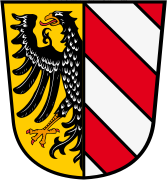Local election in Nuremberg in 1990
The local elections in Nuremberg in 1990 took place on March 18, 1990 , as in all of Bavaria . In addition to the Lord Mayor of Nuremberg, the City Council of Nuremberg was also elected.
Starting position
In the city council election in Nuremberg in 1984, the turnout for 350,283 voters was 61.2%. In the mayor elections on October 18 and November 8, 1987, Peter Schönlein of the SPD was elected as Lord Mayor in the runoff election with 57.6% of the votes cast. The strongest faction in the Nuremberg City Council was the SPD with 46.1% of the votes (34 seats), ahead of the CSU (41.4%, 30 seats) and the Greens (5.8%, 4 seats). Since there is no 5 percent hurdle in local elections , the FDP is represented with 2.4% and one seat and the DKP with 1.9% and also one seat in the city council. Of the remaining 2.7% of the votes cast, 1.1% went to the NPD , 0.6% to the electoral alliance FNW, 0.4% each to the ÖDP and the Nuremberg Citizens' Group and 0.2% to the LD.
Election of the Lord Mayor
In the major district cities of Bavaria , the title of the first mayor, directly elected by the citizens , is “ Lord Mayor ”. The city council in Nuremberg elects the second and third mayor from among its ranks. The incumbent Lord Mayor Peter Schönlein of the SPD was re-elected for the second time after 1987 with an absolute majority in the voluntary early election in the first ballot.
The official final result of the first ballot for the election of the Lord Mayor on March 2, 1990 was as follows:
| Political party | candidate | image | Votes (absolute) | Votes (in percent) |
|---|---|---|---|---|
| SPD | Peter Schönlein | 122.201 | 51.8% | |
| CSU | Oscar Schneider | 87,124 | 36.9% | |
| REP | Rudolf Heindl | 10,047 | 4.3% | |
| Free voters | Matthias Krusche | 6.217 | 3.2% | |
| GREEN | Klaus-Peter Murawski | 6.712 | 2.4% | |
| FDP | Jürgen Doeblin | 3,908 | 1.7% | |
| The good ones | Kurt Gebhardt | 3,032 | 1.3% | |
| DKP | Herbert stepfather | 1,438 | 0.6% | |
| ÖDP / FWN | Dieter Jakob | 846 | 0.4% | |
| Citizens' Party Free Voters | Walter Pfleiderer | 663 | 0.3% |
Election of the city council
As usual in local government , the Nuremberg city councils are volunteers. The professional city councils (referred to in Nuremberg as heads of the respective departments as speakers ) are directly elected by the city council for 6 years. You are a member of the city council and have the right to speak but not to vote. As a rule, the elections for the speakers in Nuremberg take place shortly before the next local elections.
The Nuremberg City Council consists of 70 members. Since there is no 5 percent hurdle , it is possible to get a seat with around 1.4% of the votes cast. In contrast to the federal and state level, election polls are rarely carried out at the municipal level. Therefore it was not possible to reflect the current mood in Nuremberg.
Each voter has as many votes as the city council has seats. In the local elections in Bavaria, voters can cumulate and variegate . Each eligible voter has 70 votes, which corresponds to the number of city council members to be elected. It is possible to give a candidate up to three votes. Candidates from different party lists can also be elected, but the total number of 70 votes must not be exceeded. It is also possible to tick an entire party list, with each candidate on the list receiving one vote. Candidates can also be removed from the checked list.
Election result
Official final result after counting all voting areas:
| Political party | Votes (absolute) |
Votes (in percent) |
Change compared to 1984 (in percentage points) |
Seats |
|---|---|---|---|---|
| SPD | 6,413,654 | 43.1% | −3.0% | 32 |
| CSU | 5,399,198 | 36.3% | −5.1% | 26th |
| GREEN | 1,233,829 | 8.3% | + 2.5% | 6th |
| REP | 999,301 | 6.7% | not started | 4th |
| FDP | 499,589 | 3.4% | +1.0% | 2 |
| DKP | 118,816 | 0.8% | −0.8% | - |
| ÖDP / FWN | 102.713 | 0.7% | −0.3% | - |
| Citizens' Party Free Voters | 50,520 | 0.3% | not started | - |
| NPD | 46,974 | 0.3% | −0.8% | - |
- Allocation of seats in the Nuremberg City Council since 1946 at the beginning of each legislative period

Postal vote
The citizens of Nuremberg can apply for postal voting documents for all elections.
See also
- Results of the local elections in Nuremberg
- Local electoral law (Bavaria)
- Administrative division of Bavaria
- List of mayors of the city of Nuremberg
Web links
- City of Nuremberg: Results of the 1990 local elections [PDF]
- City of Nuremberg: Elections in Nuremberg - election results and announcements
- City of Nuremberg: Local election in Nuremberg - information and results
Individual evidence
- ↑ a b City Council election 1984 results of the election test [PDF] on nuernberg.de, accessed on March 11, 2020
- ↑ Election of the Lord Mayor 1987 [PDF] on nuernberg.de, accessed on March 9, 2020
- ↑ a b c Official final result of the city council election of March 18, 1990 [PDF] on nuernberg.de, accessed on March 11, 2020
- ↑ No later election: Small parties flash off in the city council. April 11, 2019, accessed June 13, 2019 .






